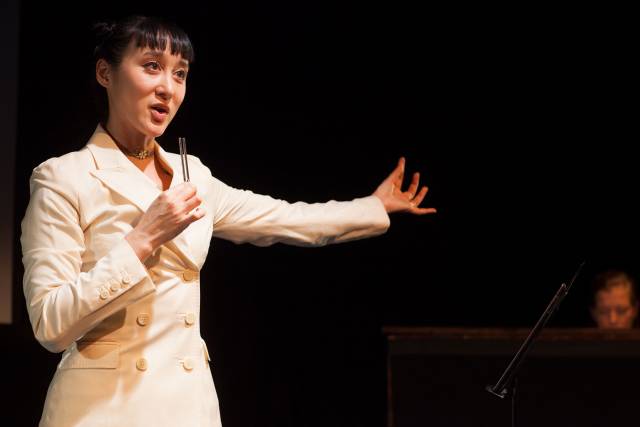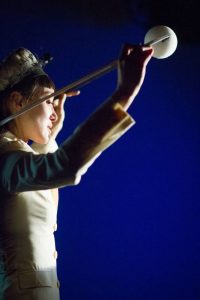

I had the privilege of seeing mezzo-soprano Hai-Ting Chinn’s astounding performance as Brother in The Scarlet Ibis, a new American opera by Stefan Weisman produced at HERE for the 2015 Prototype Festival. Ms. Chinn is back at HERE with a new opera-theater work she conceived and is performing: Science Fair: an opera with experiments, Ms. Chinn’s love song to science with musical director and pianist Erika Switzer and directed by Lisa Rothe. Tremendously versatile, Ms. Chinn has sung everything from Purcell, Mozart and Bach to The King and I. She has worked at HERE, The Wooster Group, Opera Omnia, and London’s Grimeborn festival and toured with Phillip Glass. When I spoke with her via phone about her love of both science and music, our conversation was punctuated with Hai-Ting’s delightful laughter.
What was the spark of inspiration for Science Fair?
It comes from a couple of different angles. I grew up with a mother who was a mathematician, one of the first female mathematicians to get an advanced degree from Harvard and really fought her way through the women in STEM (Science, Technology, Engineering, Mathematics) problem of her generation. She was born in 1941 and she spent a lot of her career encouraging girls to go into STEM fields, even though STEM wasn’t even an acronym back then. So I grew up doing a lot of science and math games and being encouraged as a girl to go into some kind of field in science. Of course like every kid, I wanted to be an astronaut! I loved science in high school but I sort of ended up becoming a professional musician. At some point I came back to my interest in science and started reading in my leisure time popular science books, and I felt like I wanted to do my part to advance the cause of science popularization until I decided to literally “lend my voice” to the cause of science. I suppose part of it was I found myself as a classical singer spending a lot of time celebrating and helping to uplift human cultural endeavors, some of them religious, that I didn’t necessary believe in. But finding there was a lot of great music celebrating human culture and a lot less celebrating science, which is a recent addition to human culture, relative to music, I wanted to see if I could help develop a certain new canon of celebrating science. And then another inspiration, on the silly side of things, are the songs of Tom Lehrer and They Might Be Giants [an alternative American rock band who’ve written children’s songs about science]. There is also this tradition of science comedians. I also like using music as a form of humor; taking these very complicated concepts and complicated language and by adding music you automatically add humor. I was describing this to a friend yesterday; anything you can laugh at is automatically more accessible, so that’s what Science Fair is trying to do at this point.
Tell us a little about Science Fair’s developmental journey from idea to the 2016 production at HERE.
I have a long relationship with HERE, they’re artistic family to me. I’ve been in a lot of shows at HERE and have known Kristin and Kim [Kristin Marting is the Artistic Director and Kim Whitener the Producing Director for HERE] for many, many years. When I got the idea, I proposed it for their artist residence program (HARP). Originally I thought that I would take excerpts from scientific papers and scientific books and have them set to music. And there are a couple of excerpts from Natalie Angier’s book The Canon that got left in, but it became clear during development that precision is not the strong suit of these scientific papers. In order to get across any concepts in song, I was going to have to prune things down and I started working from spoken word and blog posts of scientists and cutting them down to lyric size bits and then eventually I started to talk to scientists in person, interviewing them and then writing lyrics on those words myself or with my composers. So half of the libretto is basically written by me using the words of scientists, science teachers and writers. Then my husband and musical partner Matthew Schickele began working with me, he’s been writing songs for me for quite some time. Some of these songs we’ve performed at popular science conventions along the way.
I decided I wanted the whole show to have more musical voices in it than just Matthew’s so I asked a few more composers (Renee Favand-See, Stefan Weisman and Conrad Cummings) who I’ve had long collaborations with to throw in some of their musical voices and material. So it turned into a cabaret of science! It’s not one composer driven, but a pastiche I made in order to have a good flow through of many different kinds of voices; serious, humorous, atonal. So that’s how I made the musical material. And the theatrical material is inspired by YouTube videos of DIY science experiments, science shows like Bill Nye, The Science Guy, slide shows, TED Talks. All kind of thrown into a theatrical context. As part of its development Science Fair was in HERE’s CULTUREMART festival last year. And this year it has a full production.

There are experiments in Science Fair. In doing the piece, have there ever been any mishaps?
(Laughs) Over the course of development, I have been encouraged to stay away from experiments that could cause explosions or fires! So I actually gave up on a couple of demonstrations that I really liked and have gone for more tame versions of them at the request of the fire marshals! (Laughs) But it’s not boring!
What is your vision for Science Fair? What do you want audiences to take away from seeing this?
I want several things. I want everybody to feel the wonder of this newest human endeavor that is in the words of Natalie Angier, "the vast ocean of science." I want people to go away with a feeling of science being uplifted, being a noble human endeavor. That scientists’ work is celebrated. They really are the contemporary jurors of humanity and many of them labor away in obscurity. And I wanted people to just be amused and entertained as well. And hopefully that will make people feel like science is not some inaccessible ivory tower endeavor, but that it is everywhere! It is our newest way of exploring the world around us and it’s how the natural universe works.
As a singer, do you have any dream roles you’d like to play?
I do have a lot of dream roles that I have played that I’d love to do again on bigger stages. One of my favorite gigs ever was being in the Wooster Group production of La Didone, which combined some of my favorite music, which is very early baroque with a wild experimental production that was challenging and rewarding in equal amounts. In some ways, it is more about dream productions than particular roles. I do have particular roles I’d love to play but most of them are baritone roles! (Laughs)
Baritone?
That’s like dreaming of being an astronaut. I have dream roles but they’re going to stay in the realm of dreams. (Laughs)
I don’t know. Anything is possible these days.
(Laughs) I guess it is.
Let me just change the question slightly because of the way you just answered it. Are there are any dream teams you’d like to work with? Or dream stories you’d like to tell, that haven’t been written.
That’s such a good question. I’m sure there are. But I’m sort of a person that tends to do what comes along and…I don’t want to say “make the best of it” because that sounds negative but I try to make whatever I’m doing into the dream role.
What’s next after Science Fair?
I’m still touring with Phillip Glass singing the role of Belle in La Belle et la Bête. And I’m also a member of a new musical ensemble called HOWL which is based in New Haven and we have a big residency at Peak Performances in Montclair in 2017 called the Quixote Project.
What advice do you have for young singers today? What do young singers need to be ready for?
I would say, ready for anything! Obviously, you can’t be ready for anything. Strangely I think of a theater troupe…it’s so long ago….I was an exchange student in France when I was a teenager. The theater teacher there kept saying this word. And I really didn’t know how to translate it into English, but I’ve thought of it so much over the years. The word is La disponibilité, which basically means openness, or availability, that you just open yourself to whatever comes at you and you take it on.
That’s beautiful advice. Covers it all!
It’s a little bit of a platitude, but I don’t know how to give advice to young singers. It is very personal; everyone is different and has to make their own way. Technical demands can be different, but there are still very traditional operas to be done and hopefully by being wild out here, we are also building audience for the more traditional productions. Personally if I have a dream, one of them is to do a little more very traditional opera. I love that music, I love those productions. Because my career has been so wild, people tend to ask me to do the wildest things possible. But I’d be happy to sing some Monteverdi, some Mozart and I don’t know if there any roles for me….but some Verdi, some Puccini! Anyone wants to hire me for that, please do! (Laughs)
"Science Fair" will be performance April 13-24 at HERE.